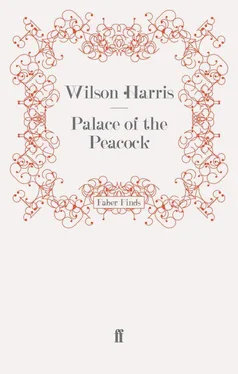Wilson Harris - Palace of the Peacock
Здесь есть возможность читать онлайн «Wilson Harris - Palace of the Peacock» весь текст электронной книги совершенно бесплатно (целиком полную версию без сокращений). В некоторых случаях можно слушать аудио, скачать через торрент в формате fb2 и присутствует краткое содержание. Год выпуска: 2013, Издательство: Faber Finds, Жанр: Современная проза, на английском языке. Описание произведения, (предисловие) а так же отзывы посетителей доступны на портале библиотеки ЛибКат.
- Название:Palace of the Peacock
- Автор:
- Издательство:Faber Finds
- Жанр:
- Год:2013
- ISBN:нет данных
- Рейтинг книги:5 / 5. Голосов: 1
-
Избранное:Добавить в избранное
- Отзывы:
-
Ваша оценка:
- 100
- 1
- 2
- 3
- 4
- 5
Palace of the Peacock: краткое содержание, описание и аннотация
Предлагаем к чтению аннотацию, описание, краткое содержание или предисловие (зависит от того, что написал сам автор книги «Palace of the Peacock»). Если вы не нашли необходимую информацию о книге — напишите в комментариях, мы постараемся отыскать её.
Palace of the Peacock — читать онлайн бесплатно полную книгу (весь текст) целиком
Ниже представлен текст книги, разбитый по страницам. Система сохранения места последней прочитанной страницы, позволяет с удобством читать онлайн бесплатно книгу «Palace of the Peacock», без необходимости каждый раз заново искать на чём Вы остановились. Поставьте закладку, и сможете в любой момент перейти на страницу, на которой закончили чтение.
Интервал:
Закладка:
Carroll ran out of the house blindly towards the cabin in the woods where Tiny, the Vigilance sister, lay. She looked old and sad lying there he thought, wrinkled in his imagination. He saw her as an old woman in the future, wrinkled and wise, the memory of her mythical incestuous child come again — living and strong as life. It was as if he came to his spiritual mother at last, and the effect of his child’s death had sealed and saved the maternal pregnancy and womb beyond all jealousy and fear and doubt.
Carroll’s mother looked up suddenly with a sense of unexplored and inexplicable joy. She was startled when she saw Vigilance. “You here?” she cried. “How long you been listening?”
Vigilance nodded dumbly. He did not know what to say. He knew that the child she carried for his father would live, and bear the eyes of the living and the dead. He felt drawn towards it as towards a child of his own.
“You are free to go too, and this time take him with you for ever when you go,” his stepmother addressed him with a curious blessing smile.
VIII
We stood on the frontiers of the known world, and on the selfsame threshold of the unknown.
Schomburgh was dead. He had died peacefully in his hammock and in his sleep.
The old crumpled Arawak woman had advised us the evening of the day before where to stop and camp for the night. It was too late she said (Schomburgh interpreting) to venture into the nameless rapids that seethed and boiled before us.
We buried Schomburgh at the foot of the broken water whose agitation was witness of the forces that lay ahead.
Carroll was dead. Schomburgh was dead. One death, a cross for father and son. They had been ghosts to each other in the limited way a man grasped reality. Schomburgh often inhabited Carroll’s shoes running from and towards his love the day it was born and had died. Carroll often listened, almost worshipping the hoax of death and age and sin in Schomburgh’s boots, like a child prematurely stricken and old with the passage of mortal conception and thought. It had been an enormous endless growing pain and fantasy — rich with the wealth of unexplored possibilities — all over and done with and secure. They had sown and won a great liberal fortune for the whole world though the full fruitage and inheritance lay yet in the future and time.
Everyone paid silent tribute in the breakfastless empty morning. None dared to say anything yet knowing their common speech was the debased coinage and currency of the dreaming folk. Silence seemed golden now and superior to the universal mask and ironic disavowal of principle in the nameless indestructible soul. The broken speech of the crew died awhile on their lips though in their affections they still heard themselves speak in the old manner of distortion and debasement. It was the inevitable and unconscious universe of art and life that still harassed and troubled them.
DaSilva broke the golden silence and expressed his misgivings aloud. “Is how much further we got to go?” He spoke to himself, forgetting his destination and turning helplessly to the old Arawak woman. There was no interpreter now Schomburgh had gone. A wrench had uprooted the instrument of communication he had always trusted in himself. And yet he knew it was a mortal relief to face the truth which lay farther and deeper than he dreamed. This deathblow of enlightenment robbed him of a facile faith and of a simple translation and memory almost.
“Is how much farther we got to go?” he cried in his helpless dull way. “The Buck woman can’t speak a word.”
Donne started unrolling his plan quickly. The country ahead was mysterious and little known he said. A long series of dangerous rapids marked the map in his hands. The neighbouring country was mountainous and crude, the trails secret and hidden. One day had passed since they left Mariella. And today — the second of the allotted seven before them — had started with an omen of good fortune, strange and shattering as it seemed. They were on the threshold of the folk. They must cling to that knowledge since — he had never seen it so clear before — it was all they had.
He felt the clearest keenest perception of their need and security. Remember — he said — when they entered the world ahead — the world of the second day — they had passed the door of inner perception like a bird of spirit breaking the shell of the sky which had been the only conscious world all knew. In the death of their comrades, the cross of father-and-son, Donne said pedantically and sorrowfully, they had started on the way to overcoming a sacred convention of evil proprietorship and gain.
The crew drew around as he turned to practical issues in hand. “Today we will reach here ,” he pointed to a little indentation where he proposed to camp next. “Tomorrow …” his voice droned on and on.
“One shear pin snap in that water and all gone,” Jennings sang out. He was frowning. He pushed his way until he stood face to face with Donne. “All this is a lot of balls,” he said.
“You can stay here if you wish,” Donne said calmly. “I will drive the motor, Vigilance will bow and Wishrop — on whom I feel I can lean more than ever — will steer. The three of us alone will go if need be, come what may. And as a matter-of-fact the daSilvas and Cameron are still with us I believe? We can do with their help.” He turned to the crew. They nodded a little.
Jennings was partly taken aback. “O, you want to leave me here, you do?” he shouted.
“Matter entirely for you,” said Donne.
Jennings laughed. Fine lines of sweat — customary to him — stood out again. His laugh resounded like a trumpet. Clearly — it came like a revelation — whatever the beads on his brow — he was without fear. A stubborn nameless streak rose and sweated him into a man who wanted a fight. Irritation and resentment boiled within him against all authority and responsibility. He saw too clearly and harshly the strength of his mechanical arm and position and the farce and guile and deception he had always experienced. The knowledge burned him and invigorated him at the same time with the honey of justification and leisure and laziness in palate and nostril. He was as good as any man he knew. “You can’t fool me no more,” he said. “All of you bastards — high and mighty alike. If I come with all you is of me own sweet will. You can’t fool me no more.” His voice brayed like a resurrection trumpet over the dead.
“Who want to fool you?” said Cameron. His heart was suddenly beating fast and loud. A shaft of nameless misery had entered and wounded him. He had never felt this sensation before. Jennings loomed upon him now with a terrifying jeer and gibe on his lips.
“Who want to fool you?” Cameron cried again. He listened closely to his own voice. It was the voice of dread: the voice of dread at the thought that nothing existed to fool and terrorize anybody unless one chose to imagine one was bewitched and a fool all one’s life. The terrible sound and vision struck him a blow, sharp and keen and intimate as a knife bursting into a drum. The ground felt that it opened bringing to ruin years of his pride and conceit.
“Who want to fool you ?” Cameron shouted in rage and indignation. He wished desperately the oracular grave under his feet would close for ever and disappear and he could cherish once again his old pagan desire and ambition. It struck him like an acute dismemberment and loss and injustice.
Jennings jeered — “You silly dope, Cameron you,” he laughed. “I shit on devils like you. By the time you fall out of one scrape you land in another. Who is you to ask me a thing?”
“What I want to know —” Cameron was in a greater rage than ever — “who trying to fool who?”
Читать дальшеИнтервал:
Закладка:
Похожие книги на «Palace of the Peacock»
Представляем Вашему вниманию похожие книги на «Palace of the Peacock» списком для выбора. Мы отобрали схожую по названию и смыслу литературу в надежде предоставить читателям больше вариантов отыскать новые, интересные, ещё непрочитанные произведения.
Обсуждение, отзывы о книге «Palace of the Peacock» и просто собственные мнения читателей. Оставьте ваши комментарии, напишите, что Вы думаете о произведении, его смысле или главных героях. Укажите что конкретно понравилось, а что нет, и почему Вы так считаете.












